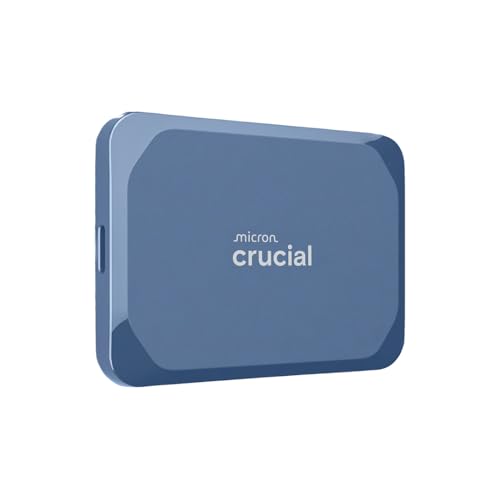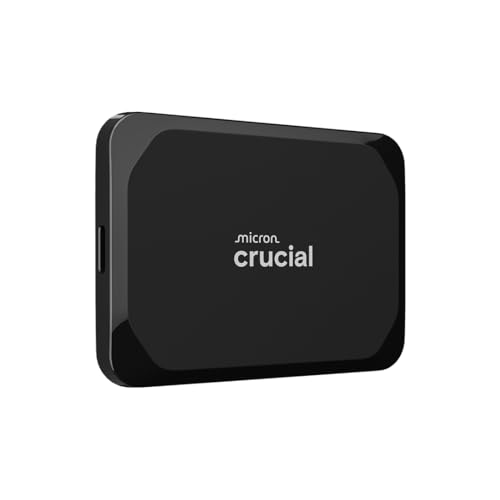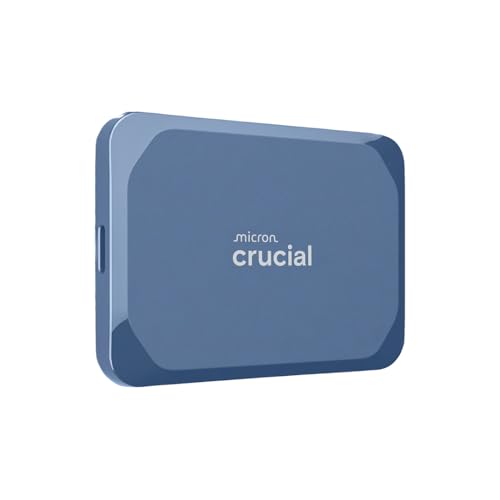Ever wondered why your super-fast SSD isn’t quite living up to its potential? Or how a seemingly small detail could dramatically affect your drive’s performance? Well, you’re in the right place! We’re diving deep into a topic often overlooked: the Crucial best allocation unit size for 120GB SSD. While 120GB SSDs might not be as common today, understanding how to optimize them is key to squeezing out every last drop of speed and efficiency. And when it comes to reliable storage, Crucial is a name many trust.
In this article, we’ll break down what allocation unit size means for your 120GB solid-state drive, discuss the recommended settings for optimal performance and longevity, and then review five fantastic Crucial SSDs that exemplify the brand’s commitment to quality and speed. Whether you’re upgrading an older system or just curious about maximizing your current setup, we’ve got you covered.
What is Allocation Unit Size and Why Does It Matter for Your SSD?
Think of your SSD like a library. When you store a book (file), the librarian (file system) needs to find a spot for it. The “allocation unit size,” also known as “cluster size,” determines the smallest block of space the librarian can use. If you have a 4KB allocation unit size, even a tiny 1KB file will take up a full 4KB block. If you have a 64KB allocation unit size, that same 1KB file would take up a whopping 64KB!
For traditional Hard Disk Drives (HDDs), larger allocation unit sizes often meant fewer read/write operations, leading to slightly faster performance at the expense of wasted space. However, SSDs work differently. They don’t have moving parts, and their speed comes from quickly accessing data blocks.
For a 120GB SSD, especially one used as a boot drive or for a specific purpose, choosing the right allocation unit size is, well, crucial. The goal is to balance efficiency (not wasting too much space) with performance (fast read/write operations).
Finding the Sweet Spot: Crucial Best Allocation Unit Size for 120GB SSD
So, what’s the magic number for a 120GB SSD? Generally, for Windows operating systems using the NTFS file system, the default allocation unit size is 4KB. For most users, this is perfectly adequate and often the Crucial best allocation unit size for 120GB SSD if you’re dealing with a mix of small and large files, like an OS drive.
- 4KB: This is the default and a safe bet for most scenarios. It minimizes wasted space, especially if you have many small files (like program files or system logs). It works well for general use, gaming, and productivity.
- 8KB or 16KB: Some users might opt for a slightly larger size if they primarily deal with larger files (e.g., video editing, large game installations). It can sometimes offer a marginal performance boost for these specific workloads by reducing the number of blocks the OS needs to manage per file. However, for a 120GB drive, this could lead to more wasted space if you also store many small files.
- 64KB: This is generally not recommended for smaller drives like 120GB SSDs unless you only store very large media files. It can significantly increase wasted space and may not offer a noticeable performance benefit for typical usage on an SSD.
Our Recommendation for 120GB SSDs: Stick with the default 4KB allocation unit size. It offers the best balance of performance and storage efficiency for the vast majority of users and workloads on a smaller 120GB drive. If you’re formatting your drive, Windows will typically default to 4KB anyway, so you probably won’t need to change a thing!
Now that we’ve cleared up the allocation unit size mystery, let’s take a look at some stellar SSDs from Crucial that embody speed, reliability, and value, even if they’re not all 120GB. These drives demonstrate the quality you can expect from Crucial for any capacity.
Our Top 5 Crucial SSD Picks
1. Crucial X10 1TB Portable SSD, Up to 2,100MB/s, USB 3.2…

This isn’t just any external SSD; the Crucial X10 is a portable powerhouse designed for those who demand uncompromising speed and rugged durability on the go. Whether you’re a content creator needing lightning-fast access to large project files, a student with a hefty digital library, or a PC gamer wanting to expand your console’s storage, the X10 stands out with its incredible read speeds and robust build. It truly redefines what a portable drive can do.
- Ultra-fast Speeds: Up to 2,100MB/s read speeds for rapid data access.
- Built to Last: IP65 dust and water resistance, plus drop resistant up to 9.8 ft (3 meters).
- Broad Compatibility: Works with Windows, Mac, iPad Pro, Chromebooks, Android, Linux, PS4, PS5, and Xbox via USB-C and USB-A.
- Ultimate Storage Capacity: Spacious 1TB for all your photos, videos, backups, and more.
- Bonus Software Included: Three months of Mylio Photos plus and Acronis True Image.
Pros:
– Exceptional transfer speeds ideal for demanding tasks.
– Highly durable and resistant to environmental factors.
– Wide range of device compatibility.
– Generous 1TB storage in a compact form factor.
Cons:
– Premium price point due to performance and durability.
– USB-C connectivity is optimal; USB-A might limit full speed.
User Impressions: Customers rave about the X10’s blistering speed and how surprisingly small and tough it is. Many highlight its seamless integration with various devices, making it a go-to for professionals and serious gamers alike who need performance without compromise.
2. Crucial P310 1TB SSD, PCIe Gen4 NVMe M.2 2280, Up…

The Crucial P310 1TB NVMe SSD brings serious speed to your internal storage, leveraging the power of PCIe Gen4. If you’re building a new PC, upgrading an existing system, or even expanding storage for select gaming handhelds, this drive offers a significant leap in performance over older Gen3 SSDs and traditional SATA drives. With its impressive read/write speeds, you’ll experience faster boot-ups, quicker game load times, and snappier multitasking, making your entire system feel more responsive.
- PCIe 4.0 Performance: Up to 7,100 MB/s read and 6,000 MB/s write speeds.
- Spacious 1TB SSD: Ample room for AAA games, applications, and media.
- Broad Compatibility: Seamlessly works with laptops, desktops, and select gaming consoles (ROG Ally X, Lenovo Legion Go, AYANEO Kun), backward compatible with PCIe Gen3.
- Better Productivity: Up to 2x faster than previous Gen3, improving boot times and application loading.
- Trusted Micron Quality: Built with advanced G8 NAND and thermal control for reliable performance.
Pros:
– Blazing-fast Gen4 NVMe speeds for an incredible user experience.
– Large 1TB capacity is perfect for serious users and gamers.
– Excellent compatibility across modern systems.
– Significantly boosts overall system responsiveness.
Cons:
– Requires a PCIe Gen4 compatible motherboard to achieve maximum speeds.
– Higher price than SATA SSDs, though competitive for NVMe Gen4.
User Impressions: Reviewers are consistently impressed by the P310’s speed, especially noting the difference in game loading and file transfers. Users appreciate its ease of installation and the noticeable upgrade it provides, praising Crucial for delivering high-end performance at a reasonable price point.
3. Crucial P310 500GB SSD, PCIe Gen4 NVMe M.2 2280, Up…

For those who need the speed of PCIe Gen4 NVMe but perhaps don’t require a full terabyte of storage, the Crucial P310 500GB SSD is an excellent choice. It delivers a substantial performance upgrade for your operating system, frequently used applications, and a handful of your favorite games, all while keeping costs down. This drive provides a fantastic balance of speed, capacity, and value, making it ideal for casual gamers, everyday home users, or as a lightning-fast secondary drive.
- PCIe 4.0 Performance: Up to 6,600 MB/s read and 5,000 MB/s write speeds.
- Spacious 500GB SSD: Enough space for essential games, apps, and media.
- Broad Compatibility: Works with laptops, desktops, and select gaming consoles; backward compatible with PCIe Gen3.
- Better Productivity: Up to 2x faster than Gen3, enhancing daily tasks like booting and app launches.
- Trusted Micron Quality: Built with advanced G8 NAND and thermal control.
Pros:
– Impressive Gen4 NVMe speeds for a mid-range capacity.
– Great value for a performance upgrade.
– Solid compatibility with current and older systems.
– Significantly improves system boot and application load times.
Cons:
– 500GB might be limiting for very large game libraries or extensive media collections.
– Full speeds require a PCIe Gen4 slot.
User Impressions: Customers love the P310 500GB for its “snappy” performance and how it transforms their computing experience. It’s often praised as a perfect boot drive or for housing core applications, with many users reporting a dramatic improvement over their previous storage solutions.
4. Crucial BX500 240GB 3D NAND SATA 2.5-Inch Internal SSD,…

If you’re looking to revitalize an older laptop or desktop that still relies on a traditional hard drive, the Crucial BX500 240GB SSD is your go-to solution. This 2.5-inch SATA drive offers an incredible performance boost without breaking the bank. It’s an energy-efficient, silent upgrade that will make your old system feel new again, providing faster boot times, quicker file loading, and overall improved responsiveness – truly a game-changer for anyone stuck with a sluggish HDD.
- Boot up faster. Load files quicker. Improve overall system responsiveness.
- 300% faster than a typical hard drive.
- Improves battery life, being 45x more energy efficient than a typical hard drive.
- Micron 3D NAND – leveraging 40 years of memory and storage technology.
- Crucial 3-year limited warranty.
Pros:
– Excellent performance upgrade over HDDs at a very affordable price.
– Dramatically improves system speed and responsiveness.
– Enhances laptop battery life due to superior energy efficiency.
– Easy installation in most 2.5-inch drive bays.
Cons:
– SATA speeds are much slower than NVMe SSDs.
– 240GB capacity can be limiting if used as a primary drive for many applications.
User Impressions: This drive is a fan favorite for budget-conscious upgrades. Users frequently commend how it “breathes new life” into older computers, praising the significant speed increase for daily tasks and the ease of migration from their old hard drives. It’s seen as a reliable and cost-effective performance booster.
5. Crucial X9 1TB Portable SSD, Up to 1050MB/s, USB 3.2…

The Crucial X9 1TB Portable SSD hits a sweet spot for casual gamers, everyday users, and anyone needing reliable, fast external storage. With speeds up to 1050MB/s, it’s significantly faster than traditional external hard drives, making it perfect for quickly backing up large files, transferring media, or expanding your console’s storage. Its robust, travel-friendly design ensures your data stays safe, even if you’re on the move, offering peace of mind alongside speedy performance.
- High-speed Performance: Up to 1050MB/s for fast file transfers, media editing, and backups.
- Built to Last: IP55 water and dust resistance, drop resistant up to 7.5 ft (2 meters).
- Broad Compatibility: Connects effortlessly with Windows, Mac, iPad Pro, Chromebooks, Android, Linux, PS4, PS5, and Xbox via USB-C and USB-A.
- High-Capacity Storage: Compact 1TB SSD for photos, videos, backups, and more.
- Bonus Software Included: Three months of Mylio Photos plus and Acronis True Image.
Pros:
– Excellent balance of speed and affordability for a portable SSD.
– Durable and resistant to water, dust, and drops.
– Highly versatile with broad device compatibility.
– Generous 1TB capacity for extensive storage needs.
Cons:
– Slower than its X10 counterpart, but still very fast compared to HDDs.
– While durable, not as extreme as the X10’s IP65 rating.
User Impressions: Users frequently highlight the X9’s impressive speed for its price point and its compact, sturdy build. It’s a popular choice for those wanting a noticeable upgrade from slower portable drives, often used for photo/video storage, game backups, and general file transfers across multiple devices.
Wrapping Up Your SSD Optimization
Hopefully, this deep dive has shed some light on the Crucial best allocation unit size for 120GB SSD and why it’s typically best to stick with 4KB for optimal performance and efficiency. While these smaller SSDs might be less common now, understanding these underlying principles helps you make smarter choices for any SSD capacity.
Crucial continues to deliver exceptional storage solutions, from lightning-fast internal NVMe drives to robust portable options. The products we reviewed today showcase their commitment to speed, reliability, and innovation. No matter your storage needs, Crucial likely has a high-quality SSD that’s perfect for the job. Remember, a little optimization goes a long way in getting the most out of your hardware!
FAQ Section
Q1: What is “allocation unit size” or “cluster size” for an SSD?
A1: The allocation unit size (AUS), also known as cluster size, is the smallest block of disk space that the file system (like NTFS for Windows) can allocate to store a file. Even if a file is smaller than the AUS, it will still occupy a full allocation unit.
Q2: Why is the allocation unit size important for SSDs, especially a 120GB SSD?
A2: For SSDs, the AUS affects both storage efficiency (how much space is wasted) and performance (how quickly data can be read or written). A smaller AUS (like 4KB) generally minimizes wasted space, which is critical on smaller drives like 120GB SSDs. It also ensures the file system aligns well with the SSD’s internal block sizes, leading to better overall performance and longevity.
Q3: What is the recommended allocation unit size for a 120GB SSD running Windows?
A3: For most 120GB SSDs used as a primary drive with Windows, the recommended and default allocation unit size is 4KB (4096 bytes). This provides the best balance between storage efficiency and performance for a mix of small and large files.
Q4: Can I change the allocation unit size after formatting my SSD?
A4: No, you cannot change the allocation unit size without reformatting the drive. Changing it requires erasing all data on the partition and re-creating it with the new cluster size. Always back up your data before performing such an operation.
Q5: Will a larger allocation unit size make my SSD faster?
A5: Not necessarily for SSDs. While a larger AUS might theoretically reduce the number of file system entries for very large files, SSDs handle small block transfers efficiently. For typical use cases, a 4KB AUS often provides optimal performance, and going larger can lead to significant wasted space, especially on smaller drives, without a discernible speed boost.
Q6: How can I check my current SSD’s allocation unit size?
A6: In Windows, you can check the allocation unit size by opening a Command Prompt or PowerShell as administrator. Type fsutil fsinfo ntfsinfo C: (replace C: with your drive letter) and press Enter. Look for “Bytes Per Cluster” in the output, which indicates your allocation unit size.
Q7: Does allocation unit size affect the lifespan of my Crucial SSD?
A7: Indirectly. An optimized allocation unit size helps the file system interact more efficiently with the SSD’s internal flash memory, reducing unnecessary read/write amplification. This can contribute to better wear leveling and potentially extend the lifespan of your Crucial SSD by ensuring data is written more efficiently.

